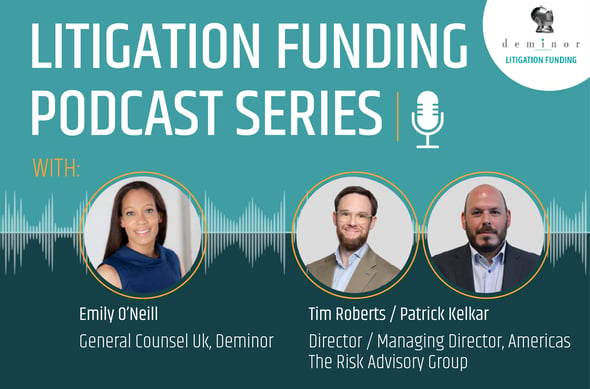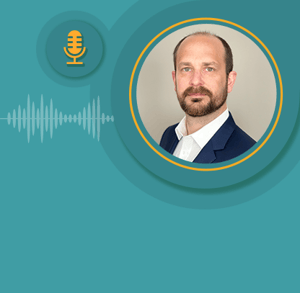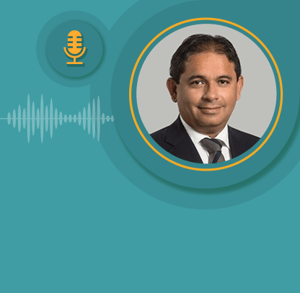In this podcast series, Emily O'Neill General Counsel UK for Deminor Litigation Funding, undertakes interviews with global professionals to discuss different aspects of the litigation funding process. We have already considered the importance of the client in litigation funding as well as the business case for funding.
Deminor welcomes you to join this conversation as we summarise the key elements of the conversations between Emily O'Neill and these experts, as captured in the podcast transcripts below.
Podcast Preface:
Deminor General Counsel UK, Emily O'Neill (EON), speaks with Tim Roberts, Director and Patrick Kelkar, Managing Director, Americas, at The Risk Advisory Group.
In this interview with Emily, Tim and Patrick give a fascinating insight into the processes and methodologies involved in understanding defendant organisations and identifying their assets.
Podcast Transcript:
EON - As part of our litigation funding process, we always look at whether the defendant will be able to pay, and if they do have the resources, whether we’ll be able to get hold of those if they refuse to pay. In other words, we look at the enforcement risk.
What do you look for within a particular organisation to understand their financial standing, and their organisational structure?
TR - That's actually one of the things that's really important when we're at the outset of any assignment. It’s what we call our early homework, and it’s the preliminary research to get an initial understanding of the footprint of the organisation, entity or series of entities. Or in some cases, it's an individual.
The first crucial point to get across is that we do see a very wide spectrum of different kinds of defendants. Therefore, depending on the relevant geography and jurisdiction, the information that is available can vary quite drastically.
For example, sometimes we'll be looking at a listed company with a very complex and disparate corporate footprint and operations in multiple jurisdictions. That also tends to mean that the information environment we're looking at will be relatively rich, and there'll be a lot of information to obtain, analyse and review.
"So, our initial research allows us to understand what kind of company we are talking about and what kind of corporate footprint it has." - TR
Conversely, sometimes we're just starting with a name or a translated or transliterated name for an entity, or a principal or a director or shareholder, and there’s an awful lot of work for us to do. In the first instance, we need to understand where the company is and the nature of its business. We can then get a sense of whether there is any information available in the public domain, and that’s going to inform our fact-finding, information review and analysis.
So, our initial research allows us to understand what kind of company we are talking about and what kind of corporate footprint it has. Sometimes that can be a very quick, efficient process. Other times, it can take hours, with an awful lot of head-scratching and research just to get to the start line.
PK - You referenced what the publicly accessible information may be and that depends on the jurisdiction. I would put this into two different categories – firstly those jurisdictions with a lot of readily accessible information, for example, the US, the UK, a number of countries in continental Europe and elsewhere. And I would juxtapose that with other jurisdictions that are more challenging when we're looking at defendants, places like China, Russia and some countries in the Middle East.
There was an article in the news recently about how the Chinese government has blocked certain corporate information providers from providing that information to foreign customers. So increasingly, it's become very difficult to access even basic corporate records in those places. Certainly, accessing information on ultimate beneficial ownership is a very challenging thing to do.
"...others that are more challenging and lead us to rely on digging deeper outside of official corporate records and getting into more of an intelligence-based approach." - PK
There's been an effort in the last year or more, to scrub some of the records. Some of that's driven by an effort to protect interests from US and European sanctions. Other times it’s down to autocratic governments protecting their own interests and those that could be accused of corruption and holding beneficial ownership in companies that may be questionable.
So, we have a mixed bag, with some jurisdictions that have a whole host of information, and others that are more challenging and lead us to rely on digging deeper outside of official corporate records and getting into more of an intelligence-based approach.
EON - So, if certain jurisdictions and publicly available registers may not be up to date, what would your approach be in those more difficult to assess jurisdictions?
PK - As Tim mentioned, the starting point is always to determine at a basic level, what is available. So we start with that understanding of the jurisdictions and what official corporate records may be available.
Then we move sideways to look at things like media reports, and databases that amalgamate information from different sources, whether that’s press reports, public filings that have been accumulated over time from Dun and Bradstreet or other sources of information. We’ll scour the web in both English and the local language, and often, it's about being very meticulous in looking at public disclosures, online reports and media reports.
We sweep all that information up, then assess where we may have gaps and where it may be useful to start talking to people. We always stage this with our clients in a very methodical way. We'll typically report to them based on everything that's out in the public record through open sources, and then together, we’ll assess how we are going to make that next step in terms of talking to former employees, people in the industry, competitors, former business partners, litigation opponents etc.
That's when we move into inquiries and interviews that can be useful for gathering information that's not contained in paper or electronic records.

TR - As Patrick said, there is that initial stage of helping the client understand the information environment, where there's almost a ‘waterfall’ of different sources of information.
In a contentious context, the gold standard is corporate registries, official filings, filed accounts, annual reports, that kind of material. In some cases, we find that quickly and efficiently, and it gives us a good understanding of what it demonstrates.
At the other end of the spectrum, you have an information environment where the corporate registry either doesn't exist or the information that is filed is extremely limited. It's very patchy and there are lots of blind spots.
Then, there are different ways, tools and technology such as aggregators, different data sources and data points to make sure that we're conducting a really meticulous search for any leads. That might be cached versions of company websites, local media reporting, perhaps in a different language which refers to a significant transaction, event, or situation involving the entity in question.
"In a contentious context, the gold standard is corporate registries, official filings, filed accounts, annual reports, that kind of material." - TR
Sometimes, this is a very iterative process. We go through this triaging process at the outset, and we can be looking at issues in a jurisdiction where public information is almost non-existent. In those instances, we’re starting to think about an intelligence-led methodology, whereby we're trying to establish factual leads, and looking to expand the scope of understanding what's available in that way.
But this is less usual, and I would say most of the time there is some kind of footprint in the public domain. Once we have a handle on that, we can start formulating the information gathering process and the analysis that's going to be possible.
Conversely, there's sometimes a misconception among clients that if you're talking about a jurisdiction like the UK, the US or Continental Europe, that the information environment will automatically be comprehensive and readily available. That's not always the case, certainly in different European jurisdictions.
"There is a vast amount of information filed at Companies House, but there is an awful lot of legwork to do to go through and analyse it to look for different clues." - TR
In fact, we sometimes find ourselves in the kind of an ironic situation where the issues are primarily in the UK. There is a vast amount of information filed at Companies House, but there is an awful lot of legwork to do to go through and analyse it to look for different clues. In that situation, we’ve got reams and reams of documents, filings and accounts, and the challenge is then about cutting through that. How do you review and analyse it carefully?
So, there's no hard and fast rule. It really does depend on a case-by-case basis.
EON - You’ve talked about the information landscape and various sources of data. How can we put together information to give you the best start in reviewing what's out there?
TR - We talk a lot in our team about identifying the client's exam question. If you had to articulate it in one or two sentences, what is the question that you're trying to answer? Obviously without being overly simplistic, as we fully appreciate that some of these matters are complicated and very nuanced.
You might have a headline question with three or four subheadings. But is the priority, for example, understanding the asset position and financial standing of a business? Is it about understanding its profile reputation and perception within a certain market or sector? Or is it understanding its recent transactional history, if it's particularly acquisitive?
It’s really helpful to think about the core question that you're trying to answer and setting that out at an early stage, as opposed to sending a whole range of different queries, thoughts, and subheadings because as I say, it's an iterative process. And when we're working on a matter, conducting research, and doing our analysis, we'll always go back to the whiteboard and think about that one central question.
"And when we're working on a matter, conducting research, and doing our analysis, we'll always go back to the whiteboard and think about that one central question." - TR
And it's sometimes important to have a conversation at a very early stage about how realistic it will be to try and answer the question. Because in some instances, depending on the nature of the question, defendant, entity or jurisdiction, there are going to be real limitations to what's possible. And we want to manage that expectation from the outset, but also think creatively about whether this is your central and primary issue. Are there other ancillary issues? Or is there other contextual information that could be relevant, given the challenges involved in drilling down into this precise issue?

PK - We're not librarians, so sometimes it’s about getting into the specific questions that are going to be most important in a case. What's going to advance the case? What's going to be the key to this particular matter? It's not just about giving us a name and saying go and collate all of this information. It's about being targeted and thinking analytically about what's going to be useful to the client. This is always the challenge, and something that we need to be thinking about.
But to answer your question, in terms of what puts us in the best position to help you, it's having really specific questions to start with. As Tim mentioned, it'll often take us in different directions, and it'll expand or contract as we go. These are challenging cases, where we’re trying to locate information that’s really hard to find. In certain jurisdictions, it just isn't available in the public record, and it can be very challenging to get to the right source. If we move on to start talking to people, and potential witnesses, we need to be very clear about what our exam questions are. The more focused we are at the beginning, the better result we're going to have at the end.
"It's about being targeted and thinking analytically about what's going to be useful to the client. This is always the challenge, and something that we need to be thinking about." - PK

EON - Which are the ‘red flag’ jurisdictions, where it's going to be really difficult to make headway?
TR - I'm always learning new answers to this as we go along, and I'm often surprised, as I think there's sometimes an assumption or a preconceived notion that certain jurisdictions will have extensive information available. If it’s a major financial services hub, or it has a regulatory authority, the assumption is that there's going to be an awful lot of financial statements, documents and information for us to sink our teeth into. That’s often not the case. For example, Switzerland can be a really challenging jurisdiction. It's sophisticated, in terms of being a major hub for financial services, and it’s got very complex legal and regulatory frameworks related to banking secrecy. So, there are lots of rules and regulations about the information companies need to file. But what we find is that there's not actually that much in there. Drilling down to find details on shareholders, directors and the structure of a company which is registered in Switzerland can be really challenging.
Another example is the Dubai International Financial Centre (DIFC). This is another very sophisticated financial hub, with regulatory oversight and which seems on the surface to be a very easy, transparent, open place to do business. Huge amounts of money flow through the jurisdiction, but there are limited disclosure obligations there too.
"Drilling down to find details on shareholders, directors and the structure of a company which is registered in Switzerland can be really challenging." - TR
We worked on a matter recently, where the client was interested in assessing the potential merits and viability of a counterclaim against a Dubai entity as part of a wider corporate group. The exam question was, does this Dubai entity have any assets?
What we discovered very quickly was that there was a real limit to the information that we could obtain through filed records. Actually, the answer lay in corporate records and disclosures made at Companies House in the UK. Through some reverse engineering and a granular review of corporate documents available in the UK, we were able to build an understanding of a complicated intergroup lending structure. We were able to establish this, in part, through information that we obtained from UK Companies House, and in part from corporate documents that we obtained in Luxembourg.
By looking the other way up the chain, we could see that while the Dubai entity appeared to be in good financial standing, it was clearly being lent money by other entities in the group.
"Through some reverse engineering and a granular review of corporate documents available in the UK, we were able to build an understanding of a complicated intergroup lending structure." - TR

PK - It’s worth adding that there's also a whole host of offshore jurisdictions, such as the British Virgin Islands, Cayman Islands, Jersey etc. These are places that have financial regulators, but in terms of the disclosure information, it can also be quite limited. It can literally be the date the company was incorporated, a Registered Agent and an address. And that's basically it. There's no share register, no financial reporting available. In those sorts of situations, it's about scouring what you can in terms of the public record. You may not get direct disclosure in the corporate filings, but you might find that this company was previously a litigant in another matter, so it can be very important to look at, for example, various courts around the world. US courts, for example, have a sort of extra territorial jurisdiction, both from a government perspective, and through being a financial centre. So often, monies and activity will come through the US, making it a jurisdiction of interest, and a location for litigation that we can tap into. So it's important to move beyond the initial location, even if the company is based, for example, in the British Virgin Islands.
"There's no share register, no financial reporting available. In those sorts of situations, it's about scouring what you can in terms of the public record." - PK
You might want to be looking in the US or the UK etc, for a footprint of activity or litigation that could be useful. And as I mentioned earlier, in places like China, it's become increasingly difficult to access information, and pursuing Chinese defendants for enforcement can be almost impossible.
We're dealing with a matter right now, which has a Chinese defendant, and the client’s key exam question is ‘identify jurisdictions outside of China, where this entity may have a footprint or assets, and any areas that are favourable for pursuing a judgement and enforcement.’
So, sometimes the jumping off point may be China, Russia, or the UAE and DIFC, but it'll take you to other jurisdictions that could be more favourable for the client. So, a foundational question is often ‘where else can we look?’
EON – What role does human intelligence play? And what questions can be answered through that route?
TR - With all of these kinds of engagements, our job is to find information that's going to better inform the client's decision-making process, and the difference and distinction between evidence and intelligence is a really important one.What we sometimes find is that admissible evidence, whether that's documents that are filed in a corporate registry, financial statements that have been audited, or something similar, tells us very little. But then we might have anecdotal feedback from several well-placed sources in the financial services sector, in that jurisdiction, who have working knowledge of the defendant entity in question. They might be able to give a really interesting insight about financial performance, a transaction that's gone wrong, or another similar issue.
It's always important to clarify at the beginning of the engagement, that the gold standard, and what is going to be of most use in the context of legal proceedings or any sort of contentious scenario, is documentary evidence.
"...the gold standard, and what is going to be of most use in the context of legal proceedings or any sort of contentious scenario, is documentary evidence." - TR
However, sometimes that documentary evidence is non-existent, or of limited use. An intelligence-led methodology might involve a series of confidential interactions with individuals who are able to comment or describe a particular set of circumstances, individuals, the structure of the business, or its reputation and profile within that market. All of that can be hugely valuable and insightful, both in a strategic context and in terms of providing the client with a better understanding of what appears to be going on, with the caveat that that sort of anecdotal feedback, or human intelligence, is not going to be admissible in court.
Also, we often find that in situations where there are lots of blind spots, or a paucity of information in the public domain, intelligence-led methodology can be critical in establishing additional factual leads.
In an ideal scenario, one methodology will complement, corroborate and lead the other, and you have the benefit of the combination of the two. It's a conversation that we have a lot, with law firms acting as external counsel at all different stages in a dispute, be that arbitration litigation or often when things are at a very early stage.
"Sometimes, if you're in a particularly challenging jurisdiction, you have to start with an intelligence-led methodology, which can then lead you into other avenues of inquiry..." - TR
We always have that conversation at the very beginning. Because although intelligence-led methodology can be very helpful, and often critical in establishing further factual leads, we need to make it clear at the outset that the outputs of that methodology and those interactions, are different, and needs to be used in a different context to documentary evidence that you'd get from a corporate register, for example.
Sometimes, if you're in a particularly challenging jurisdiction, you have to start with an intelligence-led methodology, which can then lead you into other avenues of inquiry, and ultimately lead you to documentary evidence and written material that would be admissible.

PK - I would also add that, in some situations, we work with counsel and the client to bring some of that human intelligence into a more evidentiary context, turning it into a witness statement. We've had cases in the past where we’ve been working in an arbitration or litigation context, and we’ve reached out to a variety of individuals that may have worked at the company or had some past dealings with them. It may start as intelligence, but in some cases, we've been able to successfully convince those people to sit down with counsel themselves. After speaking with us and doing a preliminary interview, they’ve provided a statement that’s admissible in arbitration proceedings.
I worked on one matter in the past, where the client asked us to obtain documentary evidence, by looking for information in the public record to try and advance their claim. We then moved to a second phase of reaching out to dozens of parties to find potential witnesses who might be willing to go on the record and provide a statement.
"So, we can be a useful tool as investigators working with counsel, in terms of intelligence gathering and talking to people, but then turning that into more of an evidentiary gathering exercise as well..." - PK
So, we can be a useful tool as investigators working with counsel, in terms of intelligence gathering and talking to people, but then turning that into more of an evidentiary gathering exercise as well, by bringing information from human sources on to the record.
EON – When you engage with human sources, how do you ensure the legality of those engagements? How do you make sure that the people you work with are providing information in a way that's compliant with local law?
PK - A key foundational approach in everything that we do, is what we call ‘investigating for the record’. Whether it's doing due diligence on the information we gather, or in the context of litigation or arbitration disputes, everything we do must be able to withstand scrutiny in courts or with government regulators. So that's our approach in terms of always complying with local laws. But to answer your specific question about gathering intelligence through talking to people, we need to make sure it’s potentially going to be admissible and certainly that it’s ethical and legal. We approach this in an overt manner, in terms of who we are, e.g. ‘I’m Patrick, from the Risk Advisory Group, and I’m looking for your help on this matter’. We approach people in a transparent way, without pretext, without misrepresenting who we are, and just directly approaching these things in a very ethical and legal way.
Our starting point in terms of our information gathering is whether it’s legitimately publicly accessible, and not tapping into information that we should not have access to publicly.
"we need to make sure it’s potentially going to be admissible and certainly that it’s ethical and legal. We approach this in an overt manner, in terms of who we are, e.g. ‘I’m Patrick, from the Risk Advisory Group, and I’m looking for your help on this matter'." - PK

TR - We have a rigorous procedure in place, from a compliance and risk management perspective, to ensure that any interaction we have with a third party in relation to any matter, is communicated in the right way. It’s crucially important that we set the scene and explain the context of the interaction.
However, that needs to be balanced with the need for client confidentiality. When we're working on engagements, the client is relying on us to access insights, perspectives, anecdotal feedback and commentary that they would not be able to obtain themselves, either because they're not able to access a particular network or a group of individuals, or in the context of legal proceedings. So clearly, we can’t divulge the specific circumstances of the engagement or the identity of our client. That has to be balanced with the need to be overt, clear and transparent. So we might say ‘We're from the Risk Advisory Group, we're working on a mandate for a particular client, and we are interested in your perspective on X Y, Z issue’.
"It's not about illegitimately accessing information that's not within the public domain. It's about trying to gather insight and an independent perspective." - TR
Another point that we often reiterate is that we would never pay people for information, but on occasion, depending on the specific circumstances, we will compensate people for their time and effort if they’ve gone away, interacted with others, had conversations and provided that feedback to us.
Intelligence-led methodology, and interacting with human sources can provide really valuable insight. It's not about illegitimately accessing information that's not within the public domain. It's about trying to gather insight and an independent perspective. If the client isn't able to access that, we can play a really critical role. But managing the risks associated with that and making sure it’s done in an entirely ethical and legitimate manner is very, very important.

EON: Without revealing any confidential information, can you give an example of a case that you're really proud of?
TR - One matter that we worked on a couple of years ago was a very complicated, multi-jurisdictional asset mapping exercise in the context of arbitration proceedings, and it was an interesting situation in that we were engaged by external counsel. We also had an existing relationship with their client, with the corporate actor, which was an international commodities house involved in a joint venture arrangement, that had gone very wrong.
It was a really complicated dispute, and one of the challenges at the outset was that both counsel and the ultimate client had a good working knowledge of the defendant party, because they had been in a commercial joint venture arrangement with them for several years, which had gone awry.
"We gathered a huge amount of information from the different jurisdictions, built a map of the defendant party’s corporate structure, and then stress tested that with the client and external counsel." - TR
On that engagement, we covered multiple jurisdictions, including the Netherlands, the UK, France, Cyprus, Finland, Kazakhstan and the British Virgin Islands. The defendant party had an incredibly complex, disparate corporate footprint, and it became very clear that while the ultimate client had a good working knowledge of the commercial operation, aspects of the business, and the corporate structure, there was also a lot that they really weren't aware of, which was right under their noses.
We gathered a huge amount of information from the different jurisdictions, built a map of the defendant party’s corporate structure, and then stress tested that with the client and external counsel.
One of the crucial items that we identified in corporate records from Cyprus, was a document that described a demerger comprising a transfer of assets between the primary defendant entity that was named in the arbitration proceedings, and a previously unknown entity.
"...we were able really to peel back the layers of the corporate structure and demonstrate to them that actually the makeup of the business, the location of certain assets, and the way it operated in a legal sense on paper was very different to the commercial reality they saw from day to day." - TR
It meant that the defendant entity, which was a named party in the arbitration proceedings, was effectively on paper, a corporate shell. This was a crucial issue for external counsel and the client, because there was then a massive challenge that they would not have been able to enforce against the primary defendant entity as all of its assets had been transferred elsewhere within the corporate group.
It’s a good example of meticulous, granular, laborious research over a long period of time. And the key information was on an obscure corporate registry, it was filed, it had been disclosed, it was there. In a sense, it was hiding in plain sight. After many months of research and analysis, we were able to gain a much better understanding.
The ultimate client came into it with extensive knowledge of their adversary, they were intimately familiar with the operations and functions of the business and yet we were able really to peel back the layers of the corporate structure and demonstrate to them that actually the makeup of the business, the location of certain assets, and the way it operated in a legal sense on paper was very different to the commercial reality they saw from day to day. So that was a really challenging one, but it was also very satisfying.
.jpg?width=590&height=393&name=businesspersons-hand-calculating-invoice-in-office.jpg_s=1024x1024%26w=is%26k=20%26c=TnNKaX4U1H3vvSQOAwOEbqC1IHNjU00Es46miGbbEJs=%20(1).jpg)
EON – I know this might depend on the situation, but what kind of timescales are we looking at in general?
TR - It varies hugely on a case-by-case basis. Depending on the exam question, we would like to think that at a relatively early stage, we would be able to give a clear understanding of what the art of the possible is. Do we think it is viable and realistic to try and answer the exam question? Or do we think there are fundamental challenges? Sometimes that can happen over a matter of days, or even hours, if we're conducting preliminary scoping research and looking to help the client understand what may be available out there, and how we would approach this with our investigation strategy.
We worked on something very recently, under significant time pressure. In just less than three weeks, we commenced the engagement, and obtained a detailed briefing from the client, which was an international law firm acting for a financial services business, in a particularly complicated dispute. They had one very simple question, and we then worked with them to establish that there were four key subheadings to the initial question. There was a real challenge around whether or not we would be able to provide the information required to give them a satisfactory answer to their core question. But the other questions that came out of it actually became crucial in weighing up their strategic advice.
That’s an interesting example in which there was a relatively detailed body of information in the public domain. But there were also limitations to corporate filings made in certain jurisdictions. And some of the intelligence feedback that we were able to gather was relatively anodyne. The question was about the asset position of an entity within a specific jurisdiction, and although we were able to identify some information, it wasn’t particularly detailed, and didn't really shed much light.
The anecdotal feedback that we got from sources in the financial services sector, focused on things like the size of their office in the jurisdiction, how many employees they seem to have, whether they were an unknown entity in that market, and the perception of their profile and how they do business.
On the one hand, we weren't able to say, here's the slam dunk answer. Here are the filed financial disclosures which demonstrate the precise asset position of this entity at a point in time.
But we were able to present extensive feedback from a range of different sources, which would lead one to the logical conclusion that they have a significant presence there. They have a large office, they have a number of employees, they have a great reputation, and they're known for doing business discreetly and carefully.
This enabled the counsel team to make a sensible judgement call about the original big picture question regarding the asset position and whether or not it was viable to pursue a further claim against the entity in question.

Litigation Funding Podcast Series - Next steps and further information:
Thanks for joining Deminor's Litigation Funding Podcast Series as we deep dive into core topics in funding litigation.
Keep a lookout for our upcoming conversations as Deminor General Counsel UK, Emily O'Neill, speaks with several more experts to get their insights into different aspects of litigation funding.
If you would like to connect with either Emily, Tim or Patrick on LinkedIn, please click on the links below:
Emily O’Neill - Deminor General Counsel UK
Tim Roberts - Director at The Risk Advisory Group
Patrick Kelkar - Managing Director, Americas at The Risk Advisory Group
***
Further Reading:
- https://www.deminor.com/en/case-studies/co-funder-proposes-sharing-of-litigation-funding-risk-to-leverage-deminors-in-house-due-diligence-capability
- https://www.deminor.com/en/case-studies/financing-assertion-of-patents-protecting-manufacturing-processes
- https://www.deminor.com/en/case-studies/telecoms-patent-assertion-multi-jurisdictional-campaigns
- https://www.deminor.com/en/case-studies/canadian-innovative-start-up-preparing-for-a-david-v-goliath-litigation-funding-battle
- https://www.deminor.com/en/case-studies/whats-the-risk-assessing-the-risk-of-counter-assertion-by-the-defendant-in-patent-litigation
- https://www.deminor.com/en/case-studies/overstepping-the-mark-litigation-funding-trade-mark-infringement
- https://www.deminor.com/en/case-studies/lights-camera-action-recovering-damages-for-infringement-of-rights-in-a-short-film
- https://www.deminor.com/en/case-studies/recovering-damages-for-stolen-software-through-litigation-funding
- https://www.deminor.com/en/case-studies/funding-in-the-pharma-sector-/-investing-in-a-case-where-litigation-is-already-ongoing






